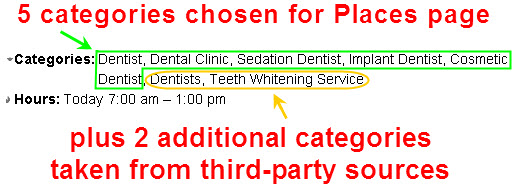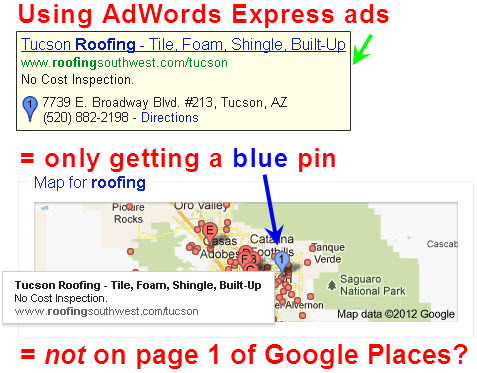I discover a lot about Google Places by wrestling with it all day, every day. But I’m also constantly scratching my head at questions—things that I just started wondering about based on observations, or that people have asked me.
Some of these questions I’ve yet to find the answers to. I know someone—maybe you, maybe me—can find the answers with a little (or a lot of) testing, studying, experimenting, analyzing, tinkering, doodling, or whatever word you prefer. Here are a few questions about Google Places that I think would make for really cool tests:
Test 1: Is there a measurable benefit in claiming your listings on third-party sites (i.e., citation sources)?
Let’s say my business is listed on Yelp, YellowPages, and SuperPages 100% correctly (as it ought to be). To what extent can it help my Google Places rankings to claim—AKA owner-verify—my listings on those third-party sites?

What I know: You’re in a better position to control your business info if you’ve claimed as many of your third-party listings as possible. This is valuable from the standpoint of keeping your info accurate and consistent across the Web, and of preventing any unethical competitors from hijacking your listings.
What I don’t know: Whether simply the act of claiming a third-party listing provides a “trust-signal” to Google that you’re the rightful business owner, which could help your Places rankings at least a little bit.
What I’d tell a client for now: “Priority #1 is to have consistent and accurate info on third-party sites. If we have to claim all your third-party listings in order to accomplish that, then we’ll claim them all. But if your info is already consistent and accurate, let’s mess with owner-verification some other time.”
Test 2: To what extent can you increase the number of business categories that show up on your Google Places page by listing your business under a broad range of categories on third-party sites—and can you get visible for more search terms this way?
As we both know, you can only pick up to 5 categories on your Google Places page. But sometimes more than 5 show up on your Places page.

What I know: Google adds these additional categories based on business info from third-party sites.
What I don’t know: There’s a lot I don’t know: First of all, exactly what information does Google draw on from third-party sites in order to assign these additional categories? That is, does Google look at the categories your business is listed under, the keywords, the tags, the text of customer reviews on third-party sites, or some mysterious combination of all of the above?
Let’s say there are more than 5 categories that accurately describe my business and I want to score some of those additional categories. How should I go about it, exactly? Most third party sites—with a few exceptions, like MapQuest—also limit the number of categories I can list myself under. So should I try to pick slightly different categories on these sites from the ones I picked for my Places page? Or is it possible that Google pays more attention to the “keywords” and “tags” fields on my third-party business listings?
Last but not least, is there any correlation between (1) the additional categories that show up on my Places page and (2) the likelihood that my business will rank more visibly for searches related to those specific additional categories? Obviously it’s good to have some additional categories show up on your Places page because they give potential customers an even better sense of what your business offers. So in terms of the “human element,” the additional categories are good. But does having more of them correspond to being visible for more search terms?
What I’d tell a client for now: “My top task is to get you visible for the 5 categories on your Places page, so I’m going to pick roughly the same categories on other sites whenever I can, in order to reinforce the 5 on your Places page. Of course, different sites have different categories to choose from, so some deviation from your 5 Google Places categories is inevitable. But I’ll always pick as many relevant categories as I’m allowed to pick, because my understanding is that will give you the greatest exposure for the greatest number of services you offer.
Test 3: How many “flags” by Google-account users does it usually take to get an obviously abusive or spammy Google Places review removed by Google?

What I know: It’s possible to get Google Places reviews removed if (1) they blatantly violate Google’s rules and (2) if Google is notified via “flags” or “Report a problem” complaints.
What I don’t know: How many flags or “Report a problem” complaints does it generally take to get a clearly abusive review taken down? From how many different Google users? Does a flag from a Google user who just opened an account and has written zero reviews “count” as much as a flag from user who opened a Google account in 2007 and has contributed 190 reviews? What does it generally take?
(Actually, obvious spam reviews have only been a problem for a couple of my clients—and neither case was recent. I simply don’t remember how much effort it took to get them removed. Plus, Google’s “support” infrastructure changes constantly; what works in one month may not work the next month.)
What I’d tell a client for now: “If we want this clearly libelous review to get taken down, you and I are going to have to flag it and report it as spam at least once every few days until Google gets the message and takes it down. If you can, tell your kids, Uncle Fred, and Aunt Ruth to open a Google account and do the same. Yes, yes, I know it’s a pain to ask them, but the alternative is to lose customers because of some moron.”
Test 4: Does it matter whether your site contains multiple non-local phone numbers that are crawlable by search engines?
What I know: It’s always a good idea to have your local phone number—the one featured on your Places page—as crawlable text on your website. It’s another clue to Google that your business in fact is local, and that the phone number listed on your Places page and elsewhere is the correct one. In cases where a business has one website but multiple locations, it’s OK to have the corresponding phone numbers for each location as crawlable text (ideally in hcard microformat); Google never seems to get the numbers confused.
What I don’t know: What if you have other crawable numbers on your site—numbers that aren’t associated with a Places page of yours? I’ve never heard of or seen a duplicate listing created by additional phone numbers on a site, nor have I ever noticed that they cause any third-party sites to use the wrong phone number. But still…is there any measurable risk in doing this?
What I’d tell a client for now: “It’s probably OK to list your 1-800 number, your secretary’s number, and your cell number as crawlable text on your site, but just to be on the safe side, let’s just take 5 minutes to add them to your site as an image, because Google can’t read images.”
Test 5: Does running AdWords Express ads cause your business to drop off of the first page of Google Places results if you’re ranked there?
One client of mine ranked well—though not #1—in Google Places until he decided to give the then-brand-new AdWords Express a try. Around the same time, Mike Blumenthal wrote that you can’t have a #1 position in Google Places and an AdWords Express ad at the same time —which Google actually confirmed. Last but not least, a couple of people have contacted me about this, wondering if it’s just their imagination or if AdWords Express ads and all page-one Google Places rankings are mutually exclusive.

What I know: I know for a fact that this wasn’t the case with the predecessor of AdWords Express, Google Boost. I know that setting up “location extensions” in an AdWords account has never harmed visibility in Google Places. I also know that Google won’t let you keep a #1 Google Places ranking if you run AdWords Express (which, again, Mike explains in this post).
What I don’t know: Whether any page-one Google Places ranking will vanish if you run AdWords Express. I’ve yet to put my suspicions to the test by asking a client with a page-one Google Places ranking for a specific search term to bid on that search term with AdWords Express and see what happens. (There must be a better way to test it than that, but I can’t think of anything as conclusive).
What I’d tell a client for now: “Express is just a dumbed-down version of AdWords to begin with. Unless your Express ads have been an absolute cash cow, switch over to classic AdWords, which is more robust and allows you—not Google—to control the text of your ads and your keyword bids and to do things like split-tests. Plus, though I don’t yet know this for a fact, I’ve found that Google Places rankings can take a major hit if you use AdWords Express, so let’s not play Russian Roulette with your business.”
—
There may or may not be good ways to test these questions. It may be tough to create conclusive tests, given that every local market is unique.
I love to procrastinate, watch TV, and eat potato chips as much as the next guy does, so it may be a while before I personally take the time to set up these tests and crunch the results 🙂
Are there any other questions that you would really like to see tested? Any suggestions for how to test the ones I mentioned? Any first-hand experience or observations? Leave a comment!
[…] 5 Google Places Tests I’d Love to See, http://www.localvisibilitysystem.com […]